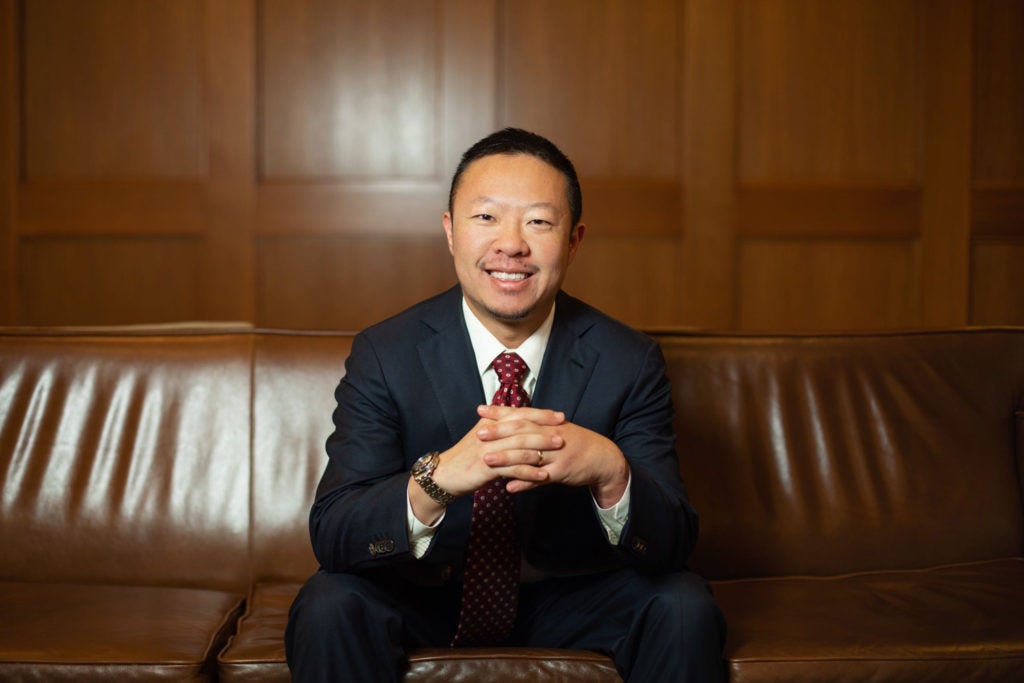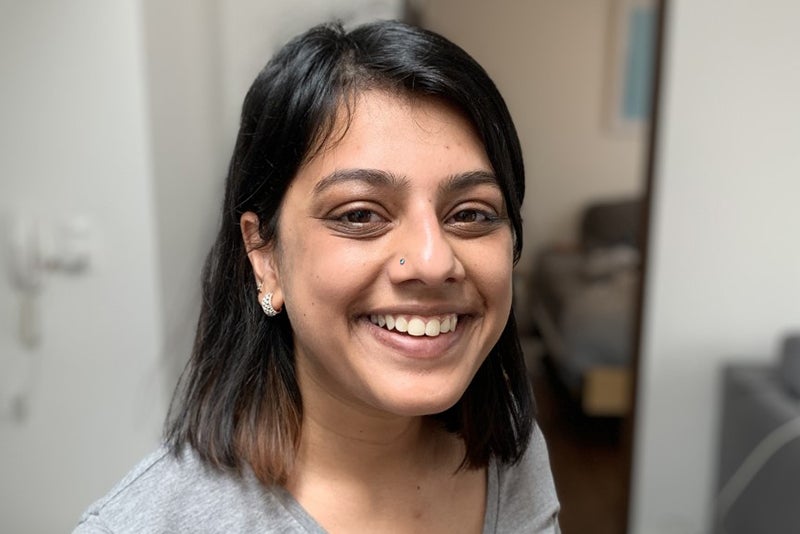by Elaine McArdle

Natasha Aggarwal LL.M. ’21 didn’t know much about polyamory until last spring, when she became a clinical student in the LGBTQ+ Advocacy Clinic at the WilmerHale Legal Services Center of Harvard Law School. But after working at the clinic with the newly created Polyamory Legal Advocacy Coalition, Aggarwal, a corporate lawyer from India who came to HLS last year to study feminist theory, says: “Now I feel very, very strongly about it.”
“People have been fired from work because their boss discovered they were polyamorous,” says Aggarwal, who is continuing her work as a summer fellow in the clinic. “It’s a problem for health insurance, for living arrangements such as leases and deeds,” she says, naming “a few of the areas that need legal protection.”
Polyamory is a form of non-monogamous relationship involving more than two adult partners at the same time, with the knowledge and consent of everyone involved, according to Polyamory Legal Advocacy Coalition, also known as PLAC, which was established in the fall of 2020 by a psychologist and five lawyers focused on LGBTQ+ issues. Among them was Harvard Law Lecturer on Law Alexander Chen ’15, founding director of the LGBTQ+ Advocacy Clinic. While polyamorous relationships come in a wide variety of forms, at their core is the idea that people should be able to choose how they shape their families, including how many consenting adults they wish to be included.

These types of relationships are becoming increasingly common, according to PLAC, which notes that 4 to 5 percent of people in the U.S. are in a consensual non-monogamous relationship. Polyamory stands out from other such relationships, PLAC explains, because polyamorists tend to be open to falling in love with more than one person. (Polyamory is different than polygamy, in which one husband has multiple wives — a practice frowned upon as patriarchal and one-sided by many polyamory advocates.) Yet despite the emphasis on love among its adherents, polyamorous relationships have few legal protections and people and families face discrimination in such basic needs as jobs, housing, and obtaining health insurance for more than one partner.
Formed as a coalition of academic and legal professionals, PLAC works to advance the civil and human rights of polyamorous people, communities, and families through legislative advocacy, public policy, and public education. Now, after years of stasis in the movement for rights, the past year has seen unprecedented success.
In 2020 and 2021, three Boston-area municipalities — the city of Somerville followed by Cambridge, and the town of Arlington — became the first in the country to extend the legal definition of domestic partnerships to include polyamorous relationships. PLAC worked on both the Cambridge and Arlington efforts, and is now working with advocates in California on domestic partnerships and non-discrimination legislation.
“After Somerville, there was a huge wave of excitement within the polyamorous community because there had been almost no movement in the political and legislative realms for a long time,” says Chen.
With the help of HLS clinical students, PLAC lent its expertise to advocates in Cambridge as they worked to extend domestic partnerships to include polyamorous relationships and families. In March 2021, the Cambridge city council approved a change in a city ordinance so that domestic partnerships encompass two or more persons not related by blood “in a relationship of mutual support, caring and commitment [who] intend to remain in such a relationship” and who “consider themselves to be a family.” And domestic partners no longer are required to live together under the new ordinance, the council decided.

“I supported this ordinance because governments have too often tried to narrowly prescribe partnership in methods that don’t align with the ways that people connect and support one another,” says Jivan Sobrinho-Wheeler, a Cambridge city councilor who worked with PLAC in advocating for the change. “This was one way we could support our residents in polyamorous relationships to apply for and receive the benefits that come with domestic partnership.”
A number of residents came forward in support, not just those in polyamorous relationships but their allies, Sobrinho-Wheeler says. “There was support both for extending the tangible benefits of domestic partnership and the recognition it can provide for things like health insurance, as well as the symbolic importance of recognizing polyamorous relationships.”
A month later, again with the guidance of PLAC, the town of Arlington voted to extend domestic partnerships to include more than two people. Amos Meeks, a representative in town government who was among a group who worked for the change, says he was inspired by Somerville’s lead. Through Facebook, Meeks connected to PLAC, which provided guidance on drafting the language, and town electors overwhelmingly approved the change.
But there’s much more work to be done, including advocating for non-discrimination laws at the state and federal levels, advocates say. “It’s pretty simple, I think,” says Meeks, who has lived with two partners since 2018. “We’re a family, we care deeply about each other, we share expenses and live in the same household and share all the little aspects of life together, but that’s not recognized under existing laws in any way. There’s no recognition and there’s no protection.”
Last spring, PLAC held a media training for people and families in polyamorous relationships. “We had over 40 people attend from the community who were interested in telling their stories,” says Chen, and clinical students followed up by interviewing them and transcribing their stories. One family of three people had been together for over 10 years, Chen says. One of the individuals was hospitalized with a serious illness; one of their partners, to whom they are married, could visit them as their wife, but the other had to lie and claim she was the sick person’s sister. The family is concerned that their family structure affects their ability to claim health insurance through one of the partners’ employer.
“People have this idea of polyamory like it’s MTV’s ‘The Real World’ with frivolous, glamorous situations, but we meet a lot of people with prosaic concerns, things like, it’s easier for me to pick up the child from preschool but I don’t have a legal relationship with the child and I’m afraid to explain it,” says Chen, who notes that these challenges echo those voiced by same-sex couples during the fight for marriage equality. Polyamorous people are also “very worried about getting fired from their jobs. There are stories of people who put that they were open to non-monogamous relationships on an online dating app and it got back to their boss and they got fired.”
This effort to extend legal recognition beyond same-sex couples to other non-traditional relationships is precisely what some conservatives worried about when the U.S. Supreme Court in 2015 held that same-sex marriage was a constitutional right. Indeed, Chief Justice John G. Roberts Jr. ’79 wrote a dissent contending that under the majority’s reasoning, polyamorous relationships would also merit protection.
This argument frustrates Aggarwal and others. “I don’t quite understand why polyamory is problematic,” says Aggarwal, who in the fall will return to India to work on reproductive rights and LGBTQ+ rights at a research center. “From my perspective it just means there is more love in the world, that your heart is so big you are capable of loving multiple people in the same capacity at the same time.”
Chen agrees. “The slippery slope argument is never compelling to me. It has been used so often to deny rights that we should have granted. When we were talking about universal suffrage, some said, ‘What’s next, women voting?’” he says. “One of the slogans of the marriage equality movement was ‘love is love’, and that’s the overwhelming feeling I’ve gotten, that people are just trying to love and support each other and have families and live their lives.” The absence of legal protections “puts stress and tension on their being able to do so.”
Increasingly, empirical data refutes concerns that some have expressed about polyamorous relationships. “This research shows that these types of relationships are not unhealthy for families and children and can be healthy and stable,” says Chen. This data is “really important when talking to legislators and judges and the public.”
And while the issue is often framed as polarizing, dividing conservatives and liberals, and it’s clear that the religious right is opposed to polyamory, the situation is more complex and nuanced than many may believe. “A lot of libertarians practice these types of relationships,” Chen says.
Polyamory is not only an important frontier in the battle for civil and human rights, but the related legal issues offer an exceptional educational opportunity for HLS clinical students, says Chen. Since last fall, clinical students have worked with city attorneys’ offices in California and Massachusetts to advance polyamorous-friendly legislation, including laws that prohibit discrimination based on relationship structures. Aggarwal has done both advocacy and research for the project, including interviewing people “with very sad stories of discrimination.”
“Pedagogically, it is really interesting. I think students have really enjoyed [working on polyamory rights] for a couple of different reasons,” says Chen, who was the first openly transgender editor of the Harvard Law Review, and who worked on LGBTQ+ impact litigation and advocacy at the National Center for Lesbian Rights and other organizations. “For one thing, the legal issues are very novel so it’s very intellectually interesting.” In addition, because they are focused on municipalities, students are learning about different kinds of governance structures, and learning how to build coalitions as they work to get local laws passed.
A core question for the clinic is imagining the future of LGBTQ+ advocacy, “and how we make sure our work remains relevant and exciting,” says Chen. As part of an academic research institution, “we are able to take on some things that are a little bit harder for some others to take on.”
“We’re hoping to not just protect polyamorous people,” he adds, “but those in other kinds of relationship structures including asexual people or aromantic people [individuals who do not feel romantic attraction to others], who experience a lot of discrimination as well.”
With a number of impact litigation cases as well as advocacy work, the clinic is growing rapidly. A new clinical instructor has been hired, and the clinic has expanded from six students in the spring to ten this coming fall. The PLAC project “is one of several projects we have that are blowing up,” says Chen, “so we’ll have plenty of work.”
Filed in: Clinical Spotlight, Clinical Voices
Tags: Alexander Chen, Class of 2021, LGBTQ+ Advocacy Clinic, Natasha Aggarwal
Contact Office of Clinical and Pro Bono Programs
Website:
hls.harvard.edu/clinics
Email:
clinical@law.harvard.edu